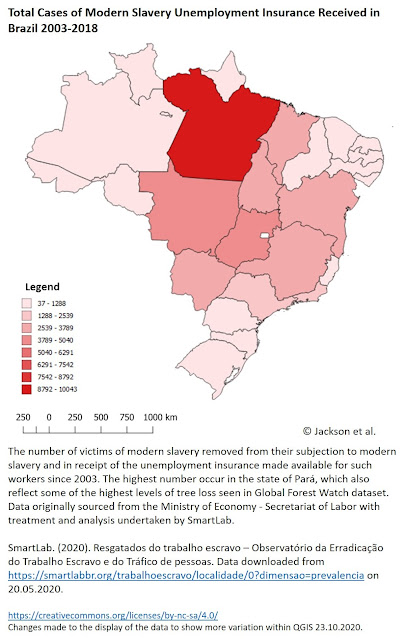FLARE (Forests & Livelihoods: Assessment, Research, and Engagement) hosted a Twitter Conference (#FLARETC20) at the end of October which was focused around the theme of "Reimagining Forests and Livelihoods in Turbulent Times". The conference was an opportunity to engage with a broad audience in a virtual platform with the added challenge of only having 5 tweets in which to do so!
What follows are those tweets and accompanying visual materials that showcase some of our preliminary work around tree loss and modern slavery within Brazil that we are undertaking. To view the original twitter thread you can click here.
____________________________________
#ModernSlavery has been linked to environmental degradation; with #forests one of the ecosystems impacted. Climate change mitigation, biodiversity, & landcover are affected. Ending tree loss cannot be achieved without ending slavery. We aim to quantify this nexus. #FLARETC20 1/5
_____________________
To understand the modern slavery-tree loss nexus we created a global risk-map using illegal logging figures, Global Slavery Index estimates & areas of deforestation from @globalforests. High-risk areas: South America & Southeast Asia.
#FLARETC20 2/5
Brazil is a high-risk area according to our analysis. Modern slavery has been found in Brazilian agri-business, linked to deforestation of the Amazon. Using satellite
@globalforests & Brazil's modern slavery data (
https://smartlabbr.org) we can quantify the nexus.
#FLARETC20 3/5
_____________________
Using these data we undertook a regression analysis for Pará to quantify the tree loss-modern slavery nexus. This is the most impacted state in Brazil. In 11 of the years assessed there was a significant p-value; indicating modern slavery has an impact on tree loss #FLARETC20 4/5
_____________________
This study is one of the first attempts to quantify the slavery-environment nexus within forestry & has found co-occurrence. Quantification is key to achieving the SDGs & ending modern slavery for the ~6-12mill. people working in environmentally degrading sectors.
#FLARETC20 5/5
____________________________________
The authors would like to thank the organisers of FLARE TC 2020 for the opportunity to present as part of the session on the 28th October 2020.
If you would like to get in contact to discuss any of the research please contact the lead on the project (myself, Bethany Jackson) either via:
twitter: @BethJackson1x
email: bethany.jackson1@nottingham.ac.uk










Comments
Post a Comment